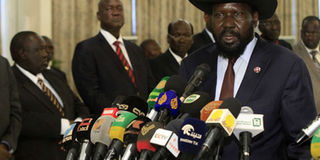Ex-minister tells of bias in S. Sudan talks

South Sudan President Salva Kiir attends a press conference at Khartoum's airport on November 4, 2014. Kenya and its peers in the region must exert more pressure on South Sudan warring parties to come to a political solution, human rights campaigners said on Friday. PHOTO | ASHRAF SHAZLY |
What you need to know:
- The former Foreign Minister in the Sudan Unity government says Juba has denied him permission to leave the country as a way of removing “independent positions” from the negotiating table.
- Dr Akol who contested against President Salva Kiir in the 2010 elections was in fact initially part of the government delegation for negotiations in Addis Ababa, Ethiopia.
- Yet he claims the government influences the political parties to pull out its negotiators so it can send in those that would advance its position under the table.
One of South Sudan’s top politicians now claims President Salva Kiir’s government is ‘negotiating with itself’ by intimidating opponents at the negotiating table.
Dr Lam Akol, who was axed from the political Parties’ Negotiating Team in September, told the Nation Tuesday President Kiir’s government has been interfering with negotiators from other political parties.
The former Foreign Minister in the Sudan Unity government says Juba has denied him permission to leave the country as a way of removing “independent positions” from the negotiating table.
“The government in Juba would like to score a rare feat: have an official government delegation comprised of the political parties in the government, and get another delegation of political parties composed of the same political parties in the same government!” he argued in an email to the Nation.
INTERMITTENT SESSIONS
South Sudan descended into chaos last December, pitting supporters of President Kiir and his nemesis Riek Machar in violence that has since claimed more than 12,000 lives.
More than two million people have been displaced with a fifth of this number scattered in Kenya, Uganda, Ethiopia and Sudan, according to the United Nations.
The Intergovernmental Authority on Development (Igad) has been holding intermittent sessions in Addis Ababa for the warring parties to negotiate and reach a lasting political solution.
A new session began last week.
Initially, the negotiators were just from President Kiir’s side and Mr Machar’s, but Igad envoys suggested a lasting solution should be drawn from the contribution of other political parties, civil society groups as well as religious leaders.
“The government of the Republic of South Sudan did not like the independent position of the political parties on the resolution of the current civil war.
“Therefore, it wanted to replace their delegation with political parties that are in the government. When it failed to do so it prevented the official delegation from travelling to Addis Ababa,” Dr Akol said.
THE PRESIDENT'S INFLUENCE
Dr Akol who contested against President Salva Kiir in the 2010 elections was in fact initially part of the government delegation for negotiations in Addis Ababa, Ethiopia.
However, when Igad envoys Seyoum Mesfin, Lazarus Sumbeiywo and Mohammed El Dabi suggested that the number of parties be increased to include other political parties and stakeholders, Akol is said to have left the government delegation to be leader of other political parties.
Yet he claims the government influences the political parties to pull out its negotiators so it can send in those that would advance its position under the table.
On Tuesday, he claimed that he had been prevented from leaving for Addis by “an immigration officer acting on the orders of the minister of Cabinet Affairs [Martin Lomuro].” He was due to lead the delegation of the political parties to the 6th round of Igad talks.
AKOL FELL OUT OF FAVOUR
But South Sudan government refuted this claim. Spokesman Mawien Ariik told the Nation Dr Akol fell out of favour with the political parties and they later removed him.
“He was part of the government team, initially, but then he came out of it to advance his own agenda. Unfortunately, the political parties he led also disagreed with him.
‘‘This has nothing to do with the government,” Mr Ariik said on phone from Juba.
About him being denied the right to travel, Mr Ariik said there are “clear security procedures” Dr Akol should go through and insisted the government had not barred him from travelling.
“He was only told not to attend the negotiations in Ethiopia as part of the delegations. As far as going anywhere else is concerned, he is free to go.”





